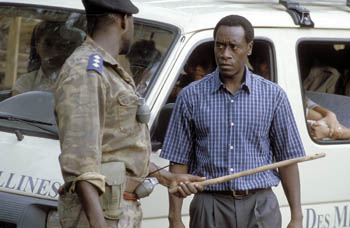![[Metroactive Movies]](/movies/gifs/movies468.gif)
[ Movies Index | Show Times | Silicon Valley | Metroactive Home | Archives ]

Photograph by Frank Connor In Harm's Way: Don Cheadle walks a dangerous line in 'Hotel Rwanda.' Hotel Hell Don Cheadle tries to hold back the terror of genocide in 'Hotel Rwanda' HERE IS an example of how to trick a European/American audience into caring about what happened to Rwanda in 1994. First, the new movie Hotel Rwanda lightly points out the guilty parties. In the background of the lobby of the hotel indicated by the title (it's actually called the Hotel Mille Collines), we see President Clinton's face on a magazine cover honoring him as "Man of the Year." Rwanda was his gravest error of policy, and it was his hair-splitting diplomats that helped keep the United States from realizing how bad the situation was over there. Director and co-writer Terry George includes a line about how it was the French who were supplying the Rwandan army with the guns later used in the slaughter. Finally, the Belgians set up the Tutsis as their go-betweens in that ghastliest of all colonies, the Belgian Congo—the original heart of darkness, and it was the whites who brought the darkness down. And there is the occasional lash to the guilt that you, the viewer, get for participating in that massive shrugging of the shoulders that greeted Hutu-led genocide in Africa. Hotel Rwanda stars an American, Don Cheadle, in the true story of a busy manager of a four-star hotel; it's the performance of Cheadle's life. His officious, clever hotel manager, Paul Rusesabagina, is a man wedged, so to speak, between the upstairs and the downstairs, skilled in maintaining the illusion of luxury living in the middle of a country about to slide into the inferno. (In the end, they have to drink the water out of the swimming pool.) The Hotel Mille Collines is a leisure service of Sabena Airlines, and Rusesabagina, a Hutu, is so Westernized that he's even learned that indispensable word in the world of business: "unacceptable." Soon, the unacceptable becomes unavoidable, as the slaughter begins. His Tutsi wife, Tatiana (Sophie Okonedo of Dirty Pretty Things), not to mention his children, are now "cockroaches"—the word the Hutus used to describe the nation they intended to kill. Since most of us grow a callous where the guilt gets whipped by reporters, Hotel Rwanda also gets under the skin with the clever use of stars, so we'll feel that relief of spotting a familiar face in a crowd of strangers. Nick Nolte co-stars as a Col. Oliver from the U.N.—furious, as such soldiers are, at the lack of material or ability to fight back. Joaquin Phoenix plays a photojournalist stuck in the hotel, where his boss faithfully transcribes the press briefings from the U.N., oblivious to the murdering going on outside the hotel compound. Phoenix has a glib line the movie could have done without—he puts the responsibility on TV watchers who would feel sorry for an instant and then change the channel. Eventually, people will watch Hotel Rwanda on TV, you know, and the film is guilty of putting a feel-good, triumph-of-the-spirit ending to a catastrophe. There isn't a one of the victims whom George saves that really burns into your eyes. But there is one face you take with you. It's Cheadle, as a man who tries to hold on to his civilization when everything else is lost.
Hotel Rwanda (PG-13; 121 min.), directed by Terry George, written by George and Keir Pearson, photographed by Robert Fraisse and starring Don Cheadle, Sophie Okonedo and Nick Nolte, plays at selected theaters.
Correction: In this review of 'Hotel Rwanda,' it was stated that Rwanda was a part of the Belgian Congo. Actually, Rwanda was part of the colony of German East Africa. In 1918, after World War I, the League of Nations awarded it and neighboring Burundi as a protectorate to Belgium. Though much more mildly governed than the Congo, Rwanda was still a colony where the Belgians introduced (in 1926) identity cards stating the nationality of the natives, Hutu and Tutsi, thus beginning the strife that led to a million deaths in 1994.
Send a letter to the editor about this story to letters@metronews.com. [ Silicon Valley | Metroactive Home | Archives ]
|
From the January 12-18, 2005 issue of Metro, Silicon Valley's Weekly Newspaper.
Copyright © Metro Publishing Inc. Metroactive is affiliated with the Boulevards Network.
For more information about the San Jose/Silicon Valley area, visit sanjose.com.